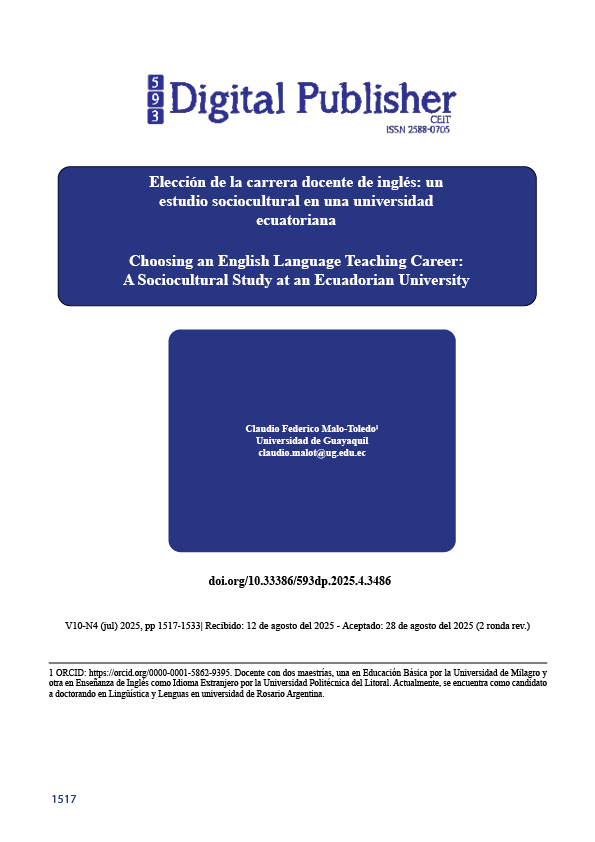Choosing an English Language Teaching Career: A Sociocultural Study at an Ecuadorian University
Main Article Content
Abstract
This study analyzes the sociocultural factors influencing the choice of an English language teaching career among first- and ninth-semester students at a public university in Ecuador. The comparison between both groups made it possible to identify similarities and differences in the factors that influenced their career choice, examining both the current motivations of those just beginning their training and those identified retrospectively by students in the final stages of their program. A quantitative, descriptive, and non-experimental approach was employed through the application of a structured questionnaire. Data were analyzed using basic descriptive statistics, frequencies and percentages, without the application of inferential tests, since the aim was to describe general trends rather than establish causal relationships. Findings show that while vocation and interest in the English language are central factors, family environment, school trajectories, economic conditions, and symbolic representations of the language and the teaching profession also play a significant role. In addition, students strongly value ethical and deontological principles such as empathy, responsibility, and respect, which reveals an ethical conception of the teaching profession. The study concludes that career choice cannot be understood solely on the basis of individual motivations, but must be situated within the cultural, social, and economic frameworks that shape academic decisions in specific contexts.
Downloads
Article Details

This work is licensed under a Creative Commons Attribution-NonCommercial-ShareAlike 4.0 International License.
1. Derechos de autor
Las obras que se publican en 593 Digital Publisher CEIT están sujetas a los siguientes términos:
1.1. 593 Digital Publisher CEIT, conserva los derechos patrimoniales (copyright) de las obras publicadas, favorece y permite la reutilización de las mismas bajo la licencia Licencia Creative Commons 4.0 de Reconocimiento-NoComercial-CompartirIgual 4.0, por lo cual se pueden copiar, usar, difundir, transmitir y exponer públicamente, siempre que:
1.1.a. Se cite la autoría y fuente original de su publicación (revista, editorial, URL).
1.1.b. No se usen para fines comerciales u onerosos.
1.1.c. Se mencione la existencia y especificaciones de esta licencia de uso.
References
Alonso Sáez, M., Lobato Fraile, M., & Arandia Loroño, M. A. (2015). La identidad profesional docente como clave para el cambio en la educación superior. Revista Complutense de Educación, 26(1), 55–73. https://doi.org/10.5209/rev_RCED.2015.v26.n1.42366
Amengual Pizarro, M., & García Laborda, J. (2017). Choosing Teaching English as a Profession in Primary Education Contexts. Online Submission, 32(2), 121-133.
Balyer, A., & K. Özcan. (2014). “Choosing Teaching Profession as a Career: Students’ Rea-sons.” International Education Studies 7 (5): 104–115. doi:10.5539/ies.v7n5p104.
Barahona, M. (2014). Pre-service teachers’ beliefs in the context of a professional development program. Profile: Issues in Teachers’ Professional Development, 16(1), 33–42.
Beauchamp, C., & Thomas, L. (2009). Understanding teacher identity: An overview of issues in the literature and implications for teacher education. Cambridge Journal of Education, 39(2), 175-189.
Beijaard, D., Meijer, P. C., & Verloop, N. (2004). Reconsidering research on teachers’ professional identity. Teaching and Teacher Education, 20, 107–128.
Beltman, S., Glass, C., Dinham, J., Chalk, B., & Nguyen, B. (2015). Drawing identity: Beginning pre-service teachers’ professional identities. Issues in Educational Research, 25(3), 225-245.
Bergmark, U., Lundström, S., Manderstedt, L., & Palo, A. (2018). Why become a teacher? Stu-dent teachers’ perceptions of the teaching profession and motives for career choice. Eu-ropean Journal of Teacher Education, 41(3), 266-281.
Biesta, G. (2020). World-centred education: A view for the present. Routledge.
Block, D. (2007). Second language identity. In T. McNamara & C. Roever (Eds.), Language testing: The social dimension (pp. 162-178). Wiley-Blackwell.
Bonder, G. (2003). Las brechas de género en el acceso, uso y apropiación de las TIC. CEPAL.
Bourdieu, P. (1986). The forms of capital. In J. Richardson (Ed.), Handbook of theory and re-search for the sociology of education (pp. 241–258). Greenwood.
British Council. (2015). English in Colombia: An examination of policy, perceptions and influencing factors. https://www.britishcouncil.org
Bruinsma, M. F., & Canrinus, E. T. (2012). The factors influencing teaching (FIT)-choice scale in a Dutch teacher education program. Asian-Pacific Journal of Teacher Education, 40 (3), 249-269.
Burns, A. (2022). Key themes and future directions in language teacher education. In Garton, S. & Graves, K. (Eds.), International perspectives on teacher education in ELT (pp. 203–219). Palgrave Macmillan.
Butcher, J., & Lewis, E. (2002). Why not teaching? Senior students have their say. Paper presented at the Australian Association for Research in Education Conference, Brisbane. Dec. 1-5.
Cambra, J. (2011). Código Deontológico para el ejercicio de la Profesión Docente. Aprobado por la Junta General del Colegio Oficial de Doctores y Licenciados en Filosofía y Letras en Ciencia de Cataluña el 28 de septiembre de 2011: España.
Cárdenas, M. L. (2016). Teacher professional development in Colombia: The case of English language teachers. Íkala, Revista de Lenguaje y Cultura, 21(2), 171–187.
Cattley, G. (2007). Emergence of professional identity for the pre-service teacher. International Education Journal, 8(2), 337-347.
Clarke, M., Hyde, A., & Drennan, J. (2012). Professional identity in higher education. In The academic profession in Europe: New tasks and new challenges (pp. 7-21). Dordrecht: Springer Netherlands.
Coulthard, M., & Kyriacou, C. (2002). Does teaching as a career offer what students are looking for? In I. Menter, M. Hutchings, & A. Ross (Eds.), The Crisis in Teacher Supply. Research and strategies for retention. Stoke on Trent: Trentham.
Day, C. (1999). Developing teachers: The challenges of lifelong learning. Falmer Press.
Day, C. (2020). The passion of teaching and the power of teachers: The challenges of educational reform. Routledge.
Díaz, M. (2018). El capital cultural y las trayectorias educativas: Aportes para una sociología crítica de la educación. Revista Latinoamericana de Estudios Educativos, 48(3), 79–99.
Erten, I. H. (2014). Understanding the Reasons behind Choosing to Teach English as a Foreign Language. Novitas-ROYAL (Research on Youth and Language), 8(1), 30-44. European Educational Research Journal. 3 (1), 49-76.
Fullan, M. (2007). The new meaning of educational change (4th ed.). Teachers College Press.
González Monteagudo, J., & Skutnabb-Kangas, T. (2011). Lenguas, poder y migraciones: Una perspectiva crítica. Revista Iberoamericana de Educación, 55(2), 1–16.
Gore, J., Holmes, K., Smith, M., & Fray, L. (2015). Investigating the factors that influence the choice of teaching as a first career. A Report commissioned by the Queensland College of Teachers. Australia: University of Newcastle.
Henkel, M. (2000). Academic identities and policy change in higher education. London: Kings-ley.
Hoveid, M. & Hoveid, H. (2004) On the possibilities of educating active reflective teachers.
http://712educators.about.com/od/teacherresources/tp/teachergood.htm
Izadinia, M. (2013). A review of research on student teachers’ professional identity. British educational research journal, 39(4), 694-713.
Kayi-Aydar, H. (2019). Language teacher identity. Language Teaching, 52(3), 281-295.
Klassen, R. M., & Chiu, M. M. (2010). Teachers’ job commitment and intention to quit: Impacts of career stage, self-efficacy, job stress, and teaching context. In revision with Contemporary Educational Psychology.
Knoblauch, D., & Woolfolk Hoy, A. (2008). “Maybe I can teach those kids.” The influence of contextual factors on student teachers’ efficacy beliefs. Teaching and Teacher Education, 24, 166e179.
Knobloch, L. K. (2005). Evaluating a contextual model of responses to relational uncertainty increasing events: The role of intimacy, appraisals, and emotions. Human Communication Research, 3(1), 60-101.
Kyriacou, C., & Benmansour, N. (1999). Motivation to become a teacher of a foreign language. Language Learning Journal, 19(1), 69-72.
Lawver, R. G., & Torres, R. M. (2011). Determinants of Pre-Service Students’ Choice to Teach Secondary Agricultural Education. Journal Agricultural Education, 52(1), 61-71.
Lizasoain, A. (2021). Perfil del profesor de inglés en Chile: quién es y qué enseña. Educar, 57(1), 0189-205.
Lovón, M. (2023). La necesidad de decolonialismo lingüístico sobre el subtitulaje en inglés. Texto livre, 16, e41785.
Manuel, J., & Hughes, J. (2006). It has always been my dream: Exploring pre-service teachers’ motivations for choosing to teach. Teacher Development, 10 (1), 5-24.
Martínez, M., & Lucero, B. (2020). Educación rural y formación docente: Una mirada desde la equidad. Revista Colombiana de Educación, (78), 83–106.
Ministerio de Educación del Ecuador. (2022). Plan Nacional de Desarrollo Educativo 2022–2025. Quito: Ministerio de Educación.
Ministerio de Educación del Ecuador. (2016). Programa Nacional de Inglés 2016–2025. Quito: Ministerio de Educación.
Mogollón, M. Y. O. (2022). PRINCIPIOS DEONTOLÓGICOS PARA UNA EFECTIVA LABOR GERENCIAL DEL DIRECTIVO DOCENTE. TRABAJO DE GRADO DE MAESTRÍA.
Moscovici, S. (2000). Social representations: Explorations in social psychology. Polity Press.
Norton, B. (2013). Identity and language learning: Extending the conversation. Multilingual Matters.
Nymark, J. (2024). LA LENGUA, MÁS QUE COMUNICACIÓN. Revista Ñe›ẽ, 2(1), 14-24.
Octavia, S. A. (2020). Sikap dan kinerja guru profesional.
Ozbek, R. (2007). Ogretmen Adaylarinin Ogretmenlik Meslegini Tercih etmelerinde Kisisel, Ekonomik veSosyal Faktorlerin Etkililik Dercesine Iliskin Algilari. Firat Universitesi Sosyal Bilimler Dergisi, 17(1), 145-159 [In Turkish].
Pennington, M. C., & Richards, J. C. (2016). Teacher identity in language teaching: Integrating personal, contextual, and professional factors. RELC journal, 47(1), 5-23.
Pérez, A., & López, J. (2022). Aplicación de la teoría de la autodeterminación en la formación docente. Ciencia Latina, 6(1), 112–130. https://ciencialatina.org/index.php/cienciala/article/download/14924/21242
Pérez, M. Q. (2024). El inglés como lingua franca de la ciencia en relación con la lengua española: perspectivas desde el campo de la astrofísica. Epos: Revista de filología, (40), 179-205.
Quintana, O. (2016). Deontología del docente, formador de formadores, en el subsistema de Educación universitaria, en su rol investigador. Revista ARJÉ, 10, 19.
Ralston Saul, J. (1992) Voltaire’s bastards: the dictatorship of reason in the West (New York, The Free Press).
Richards, J. C. (2017). Teaching English through English: Proficiency, pedagogy and profes-sionalism. RELC Journal, 48(1), 7–30. https://doi.org/10.1177/0033688217690059
Richardson, P. W., & Watt, H. M. G. (2010). Current and future directions in teacher motiva-tion research. In T. C. Urdan & S. A. Karabenick (Eds.), The decade ahead: Applica-tions and contexts of motivation and achievement (pp. 139–173). Bingley: Emerald. http://dx.doi.org/10.1108/ama
Sachs, J. (2005). Teacher education and the development of professional identity: learning to be a teacher 1. In Connecting policy and practice (pp. 5-21). Routledge.
Santoyo, G. B., Huerta, E. A. R., & Bernal, J. M. G. (2021). La importancia e influencia del idioma inglés dentro del campo científico. Revista Lengua y Cultura, 3(5), 46-51.
See, B. H., Munthe, E., Ross, S. A., Hitt, L., & El Soufi, N. (2022). Who becomes a teacher and why?. Review of Education, 10(3), e3377.
Shulman, L. S. (2005). Signature pedagogies in the professions. Daedalus, 134(3), 52-59.
Tataroglu, B., Ozgen, K., & Alkan, H. (1998). Matematik ogretmen adaylarinin ogretmenliği tercih nedenleri vebeklentileri. 2nd International Conference on New Trends in Education and Their Implications, Siyasal Kitabevi, Antalya-Turkey, April 27-29, 998-1006.
Tenti Fanfini, E. (2005). La condición docente: análisis comparado de la Argentina, Brasil, Perú y Uruguay.
Tenti Fanfani, E. (2009). El oficio de docente: Vocación, trabajo y profesión en el siglo XXI. Siglo XXI Editores.
Timoštšuk, I., & Ugaste, A. (2010). Student teachers’ professional identity. Teaching and teacher education, 26(8), 1563-1570.
UNESCO. (2016). Docentes en América Latina y el Caribe: realidad y desafíos. UNESCO, Oficina Regional de Educación para América Latina y el Caribe.
UNESCO. (2020). Informe de seguimiento de la educación en el mundo 2020: Inclusión y edu-cación: Todos y todas sin excepción. Recuperado de https://unesdoc.unesco.org/ark:/48223/pf0000374817
Universidad Católica Benedicto XVI. (s.f.). Código deontológico del docente [Presentación]. Scribd. https://es.scribd.com/presentation/602391323/CODIGO-DEONTOLOGICO-DEL-DOCENTE
Urrego, L. C. M. (2024). La Competencia Intercultural en la Enseñanza del Inglés como Lengua Extranjera. Ciencia Latina Revista Científica Multidisciplinar, 8(2), 4843-4860.
Vergara, K., Romero, I. R. C., & Solórzano, R. J. P. (2023). Factors that Influence Major Choice of Pedagogy of National and Foreign Languages Students at Santa Elena University, Ecuador: Latam: revista latinoamericana de Ciencias Sociales y Humanidades, 4(2), 127.
Villanueva, J. (2006). La filosofía y la formación docente hacia la construcción y consolidación de una praxis educativa más consciente, crítica y participativa. Laurus, 12(Ext), 206-235.
Watt, H. M. G., & Richardson, P.W. (2008). Motivations, perceptions, and aspirations concerning teaching as a career for different types of beginning teachers. Learning and Instruc-tion, 18, 408e428.
Zeichner, K. (2010). Rethinking the Connections Between Campus Courses and Field Experiences in College- and University-Based Teacher Education. Journal of Teacher Education, 61(1–2), 89–99.


